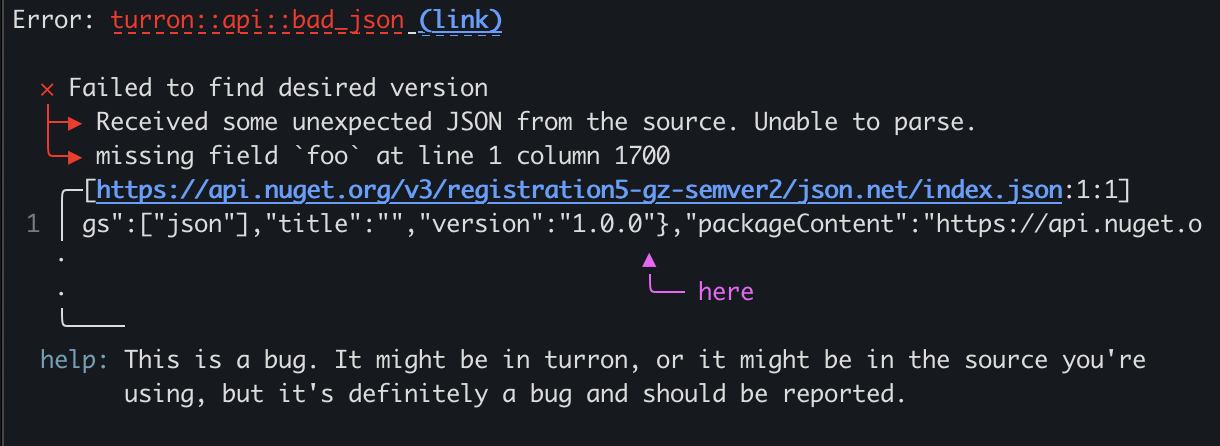Dealing with Errors
Quoting from the Dragon Book
Most programming language specifications do not describe how a compiler should respond to errors; error handling is left to the compiler designer. Planning the error handling right from the start can both simplify the structure of a compiler and improve its handling of errors.
A fully recoverable parser can construct an AST no matter what we throw at it. For tools such as linter or formatter, one would wish for a fully recoverable parser so we can act on part of the program.
A panicking parser will abort if there is any grammar mismatch, and a partially recoverable parser will recover from deterministic grammars.
For example, given a grammatically incorrect while statement while true {}, we know it is missing round brackets, and the only punctuation it can have are round brackets, so we can still return a valid AST and indicate its missing brackets.
Most JavaScript parsers out there are partially recoverable, so we'll do the same and build a partially recoverable parser.
INFO
The Biome parser is a fully recoverable parser.
Rust has the Result type for returning and propagating errors. In conjunction with the ? syntax, the parse functions will remain simple and clean.
It is common to wrap the Result type so we can replace the error later:
pub type Result<T> = std::result::Result<T, ()>;Our parse functions will return a Result, for example:
pub fn parse_binding_pattern(&mut self, ctx: Context) -> Result<BindingPattern<'a>> {
match self.cur_kind() {
Kind::LCurly => self.parse_object_binding_pattern(ctx),
Kind::LBrack => self.parse_array_binding_pattern(ctx),
kind if kind.is_binding_identifier() => {
// ... code omitted
}
_ => Err(()),
}
}We can add an expect function for returning an error if the current token does not match the grammar:
/// Expect a `Kind` or return error
pub fn expect(&mut self, kind: Kind) -> Result<()> {
if !self.at(kind) {
return Err(())
}
self.advance();
Ok(())
}And use it as such:
pub fn parse_paren_expression(&mut self, ctx: Context) -> Result<Expression> {
self.expect(Kind::LParen)?;
let expression = self.parse_expression(ctx)?;
self.expect(Kind::RParen)?;
Ok(expression)
}INFO
For completeness, the lexer function read_next_token should also return Result when an unexpected char is found when lexing.
The Error Trait
To return specific errors, we need to fill in the Err part of Result:
pub type Result<T> = std::result::Result<T, SyntaxError>;
^^^^^^^^^^^
#[derive(Debug)]
pub enum SyntaxError {
UnexpectedToken(String),
AutoSemicolonInsertion(String),
UnterminatedMultiLineComment(String),
}We call it SyntaxError because all "early error"s defined in the grammar section of the ECMAScript specification are syntax errors.
To make this a proper Error, it needs to implement the Error Trait. For cleaner code, we can use macros from the thiserror crate:
#[derive(Debug, Error)]
pub enum SyntaxError {
#[error("Unexpected Token")]
UnexpectedToken,
#[error("Expected a semicolon or an implicit semicolon after a statement, but found none")]
AutoSemicolonInsertion,
#[error("Unterminated multi-line comment")]
UnterminatedMultiLineComment,
}We can then add an expect helper function for throwing an error if the token does not match:
/// Expect a `Kind` or return error
pub fn expect(&mut self, kind: Kind) -> Result<()> {
if self.at(kind) {
return Err(SyntaxError::UnexpectedToken);
}
self.advance(kind);
Ok(())
}The parse_debugger_statement can now use the expect function for proper error management:
fn parse_debugger_statement(&mut self) -> Result<Statement> {
let node = self.start_node();
self.expect(Kind::Debugger)?;
Ok(Statement::DebuggerStatement {
node: self.finish_node(node),
})
}Notice the ? after the expect, it is a syntactic sugar called the "question mark operator" for making the function return early if the expect function returns a Err.
Fancy Error Report
miette is one of the nicest error reporting crate out there, it provides a fancy colored output

Add miette to your Cargo.toml
[dependencies]
miette = { version = "5", features = ["fancy"] }We can wrap our Error with miette and not modify the Result type defined in our parser:
pub fn main() -> Result<()> {
let source_code = "".to_string();
let file_path = "test.js".to_string();
let mut parser = Parser::new(&source_code);
parser.parse().map_err(|error| {
miette::Error::new(error).with_source_code(miette::NamedSource::new(file_path, source_code))
})
}